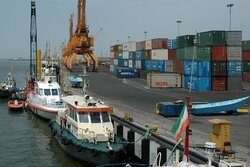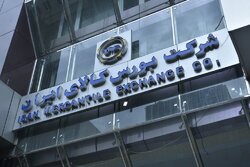
Iran-EAEU H1 trade up 40% yr/yr

According to the spokesman of Islamic Republic of Iran Customs Administration (IRICA) Ruhollah Latifi, Iran traded 5,549,311 tons of commodities worth $2,483,129,784 with the EAEU members, up also 12 percent in terms of weight, IRIB reported.
The Islamic Republic exported over 1.167 million tons of goods worth more than $514.399 million to the EAEU in the period under review, five percent and 36 percent more than the previous year’s same period in terms of weight and value, respectively.
During the said six months, the Russian Federation with $270.394 million, Armenia with $123.675 million, Kazakhstan with $78.628 million, Kyrgyzstan with $32.195 million, and Belarus with $9.505 million of imports were the top destinations for the Iranian exports to the EAEU, according to Latifi.
Iran also imported over 4.381 million tons of goods worth more than $1.968 billion from the block in the mentioned period, registering 14.5 percent and 41 percent rise in terms of weight and value, respectively, the official said.
Russian Federation with $1.716 billion, Kazakhstan with $234.77 million, Belarus with $12.183 million, Armenia with $4.627 million, and Kyrgyzstan with $372,441 were the top five sources of Iranian imports.
Iran and Eurasian Economic Union reached a free trade agreement in October 2018 based on which about 862 commodity data-x-items were subjected to preferential tariffs.
The interim agreement enabling the formation of a free trade area between Iran and the EAEU was signed on May 17, 2018, and officially came into force on October 27, 2019.
Iran is a very important market in the region and the development of ties with this country is of high significance for the EAEU members (Russia, Belarus, Armenia, Kazakhstan, and Kyrgyzstan).
The free trade agreement between Iran and this union has laid the ground for the expansion of trade ties between the two sides.
The agreement with the bloc has increased Iran’s exports to the EAEU member states significantly, which is a turning point for the Islamic Republic's plans for boosting non-oil exports during the U.S. sanctions.
Source: Tehran Times


Trump weighs using $2 billion in CHIPS Act funding for critical minerals

Codelco cuts 2025 copper forecast after El Teniente mine collapse

Electra converts debt, launches $30M raise to jumpstart stalled cobalt refinery

Abcourt readies Sleeping Giant mill to pour first gold since 2014

Barrick’s Reko Diq in line for $410M ADB backing

Nevada army depot to serve as base for first US strategic minerals stockpile

Tailings could meet much of US critical mineral demand – study

Viridis unveils 200Mt initial reserve for Brazil rare earth project

SQM boosts lithium supply plans as prices flick higher

Energy Fuels soars on Vulcan Elements partnership

Northern Dynasty sticks to proposal in battle to lift Pebble mine veto

Giustra-backed mining firm teams up with informal miners in Colombia

Critical Metals signs agreement to supply rare earth to US government-funded facility

China extends rare earth controls to imported material

Galan Lithium proceeds with $13M financing for Argentina project

Silver price touches $39 as market weighs rate cut outlook

First Quantum drops plan to sell stakes in Zambia copper mines

Ivanhoe advances Kamoa dewatering plan, plans forecasts

Texas factory gives Chinese copper firm an edge in tariff war

Energy Fuels soars on Vulcan Elements partnership

Northern Dynasty sticks to proposal in battle to lift Pebble mine veto

Giustra-backed mining firm teams up with informal miners in Colombia

Critical Metals signs agreement to supply rare earth to US government-funded facility

China extends rare earth controls to imported material

Galan Lithium proceeds with $13M financing for Argentina project

Silver price touches $39 as market weighs rate cut outlook

First Quantum drops plan to sell stakes in Zambia copper mines

Ivanhoe advances Kamoa dewatering plan, plans forecasts


















